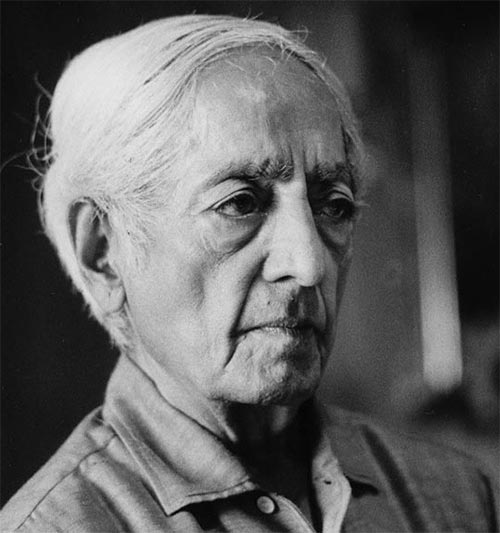J. Krishnamurti
What we are doing is to explore into ourselves like scientists, not depending on anybody. If you trust anybody you are lost, whether you trust your analyst, your priest, or your own memory, your own experience; because that is the past. And if you are looking with the eyes of the past at the present, then you will never understand what the living thing is.
So we are examining together this living thing, which is you, life, whatever that is; that means we are looking at this phenomenon of violence, first at the violence in ourselves and then at the outward violence. When we have understood the violence in ourselves then it may not be necessary to look at the outward violence, because what we are inwardly, we project outwardly.
By nature, through heredity, through so-called evolution, we have brought about this violence in ourselves. That is a fact: we are violent human beings. There are a thousand explanations why we are violent. We will not indulge in explanations, because we can get lost, with each specialist saying, ‘This is the cause of violence’. The more explanations we have, the more we think we understand, but the thing remains as it is. So please bear in mind all the time that the description is not the described; what is explained is not what is.
There are many explanations which are fairly simple and obvious – overcrowded cities, overpopulation, heredity and all the rest of it; we can brush all that aside. The fact remains that we are violent people. From childhood we are brought up to be violent, competitive, beastly to one another. We have never faced the fact. What we have said is: ‘What shall we do about violence?’
The moment you put that question: ‘What shall we do about it?’ your answer will always be according to the past. Because that is the only thing you know: your whole existence is based on the past, your life is the past. If you have ever looked at yourself properly, you will see to what an extraordinary extent you are living in the past.
All thinking is response of the past, the response of memory, knowledge and experience. So thinking is never new, never free. With this process of thinking you look at life, and therefore when you ask, ‘What shall I do about violence?’ you have already escaped from the fact.
So can we learn, observe, what violence is? Now, how do you look at it? Do you condemn it? Do you justify it? If you do not, then how do you look at it? Please do this as we are talking about it – it is tremendously important. Do you look at this phenomenon, which is yourself as a violent human being, as an outsider looking within? Or do you look at it without the outsider, without the censor?
When you look, do you look as an observer, different from the thing you look at – as one who says, ‘I am not violent, but I want to get rid of violence’? When you look that way you are assuming one fragment to be more important than the other fragments.
When you look as one fragment looking at the other fragments, then that one fragment has assumed authority, and that fragment causes contradiction and therefore conflict. But if you can look without any fragment, then you look at the whole without the observer.
Excerpted from jkrishnamurti.org. The 115th birth anniversary of J.Krishnamurti was observed on May 11.







